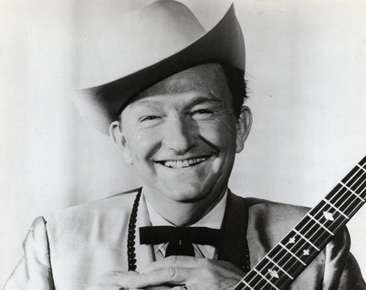
On This Day ….
 On June 19, 1914, Lester Flatt was born in Duncan’s Chapel, Overton County, Tennessee. Had he lived until today he would be 100 years old.
On June 19, 1914, Lester Flatt was born in Duncan’s Chapel, Overton County, Tennessee. Had he lived until today he would be 100 years old.
Lester Raymond Flatt, the singer and guitarist (and occasional mandolin player), first came to prominence as a member of Bill Monroe’s Blue Grass Boys in 1945.
He was one of nine children. Young Lester Flatt was taught by his father to play the drop-thumb frailing banjo style, but could never master it so he quit to divert his energies elsewhere. By the age of seven, he was playing guitar and singing in the church choir, indicating that his efforts were rewarded.
As a teenager, he left to work as a rayon weaver at the Sparta Silk Mill, Sparta, North Carolina. During the next few years Flatt and his new wife Gladys moved around working at mills in Johnson City, Tennessee, and Roanoke, Virginia.
 The couple did a bit of entertaining locally as a side-line before Flatt joined Charlie Scott’s Harmonizers working on Radio WDBJ, in Roanoke. About this time he began to suffer with rheumatoid arthritis which forced him to cease mill work. The extra free time enabled him to pursue music on a more regular basis. Following a move to Burlington, North Carolina, Flatt joined veteran entertainer Clyde Moody on Radio WBBB where he sang tenor to Moody and played mandolin with Moody’s band.
The couple did a bit of entertaining locally as a side-line before Flatt joined Charlie Scott’s Harmonizers working on Radio WDBJ, in Roanoke. About this time he began to suffer with rheumatoid arthritis which forced him to cease mill work. The extra free time enabled him to pursue music on a more regular basis. Following a move to Burlington, North Carolina, Flatt joined veteran entertainer Clyde Moody on Radio WBBB where he sang tenor to Moody and played mandolin with Moody’s band.
It was during this period that Flatt also worked with Jim Hall and the Crazy Mountaineers.
In 1943 Flatt joined Charlie Monroe’s Kentucky Pardners in Winston-Salem, North Carolina, singing tenor and playing mandolin. The band had a spot on Radio WSJS, working on the Noon-Day Jamboree, which was broadcast over seven radio stations and brought tremendous appearance demand, so much so that Monroe bought a 2,000 seat tent.
Although Flatt usually played mandolin with the band, it was here that most of Flatt’s guitar playing became refined, playing as he did with a thumb pick and a steel pick on the index finger. Flatt played guitar bass runs and melodies with his thumb-pick on the low strings, while brushing the high strings with his first finger to add rhythm.
 In March 1945 Bill Monroe invited Flatt to join his Blue Grass Boys as guitarist and lead singer. With his distinctive voice, signature guitar runs and talents as a songwriter, Flatt was the complete package.
In March 1945 Bill Monroe invited Flatt to join his Blue Grass Boys as guitarist and lead singer. With his distinctive voice, signature guitar runs and talents as a songwriter, Flatt was the complete package.
Along with Earl Scruggs (who joined in December 1945), Chubby Wise, and Howard “Cedric Rainwater” Watts, Flatt formed what is known as the classic version of the Blue Grass Boys. The group was only together for about two years, but the sound it established set the pattern for all the bands to come.
Bill Monroe once said of Flatt, “He was a powerful man in bluegrass music.”
During those years with Monroe, Lester Flatt established himself as one of the all-time pre-eminent lead singers in bluegrass music.
That group recorded 28 tracks, laid down during four sessions, some of the songs, such as Why Did You Wander? Will You Be Loving Another Man? and When You Are Lonely, were written in part, if not in their entirety, by Flatt.
Lester Flatt, tired of the incessant traveling, left the Blue Grass Boys in February 1948.
Later that year Lester Flatt joined with Earl Scruggs and Cedric Rainwater to work as a trio, before, briefly, adding Jim Eanes to their number, along with Jim Shumate. The band became more established when Mac Wiseman joined them and they went to work at Radio WCYB, Bristol, Tennessee/Virginia.
From these tentative steps Flatt & Scruggs went on to work together leading the Foggy Mountain Boys, a reference to the popular Carter Family song Foggy Mountain Top.
They worked together for 21 years becoming, during that time, the most popular bluegrass act of their generation.
 They recorded for Mercury Records (1948 – 1950) and Columbia Records (1950 – 1969) with songs such as My Cabin in Caroline, Come Back Darling, I’ll Never Shed Another Tear, Down the Road, Head Over Heels in Love with You, Why Did You Wander, We’ll Meet Again, Sweetheart, I’m Gonna Sleep with One Eye Open, Bouquet in Heaven, God Loves His Children, Get in Line, Brother, I’m Going to Make Heaven My Home, I’m Working on a Road to Gloryland, Be Ready for Tomorrow May Never Come, Little Girl [of Mine] in Tennessee, Don’t Get Above Your Raisin’, Cabin on the Hill and The Old Home Town all written by Flatt through the years.
They recorded for Mercury Records (1948 – 1950) and Columbia Records (1950 – 1969) with songs such as My Cabin in Caroline, Come Back Darling, I’ll Never Shed Another Tear, Down the Road, Head Over Heels in Love with You, Why Did You Wander, We’ll Meet Again, Sweetheart, I’m Gonna Sleep with One Eye Open, Bouquet in Heaven, God Loves His Children, Get in Line, Brother, I’m Going to Make Heaven My Home, I’m Working on a Road to Gloryland, Be Ready for Tomorrow May Never Come, Little Girl [of Mine] in Tennessee, Don’t Get Above Your Raisin’, Cabin on the Hill and The Old Home Town all written by Flatt through the years.
Flatt & Scruggs became members of the Grand Ole Opry (in 1955) and earned major sponsorship with backing from Martha White Mills whose flour was heralded in their theme song for many years. Initially, they worked on their WSM radio show.
Also in 1955 they began another long liaison with Martha White hosting their own TV shows.
 In 1962, the year Flatt & Scruggs played at Carnegie Hall, the duo appeared in the TV series The Beverly Hillbillies, a CBS program that continued for nine seasons. A spin off from that was a recording of the show’s theme song, The Ballad of Jed Clampett, that spent twenty weeks on the Billboard country singles charts, reaching a peak of number one for three weeks during January and February 1963. It was also a top 50 single on the pop charts.
In 1962, the year Flatt & Scruggs played at Carnegie Hall, the duo appeared in the TV series The Beverly Hillbillies, a CBS program that continued for nine seasons. A spin off from that was a recording of the show’s theme song, The Ballad of Jed Clampett, that spent twenty weeks on the Billboard country singles charts, reaching a peak of number one for three weeks during January and February 1963. It was also a top 50 single on the pop charts.
That popularity was sustained by further chart entries, the most successful were Pearl, Pearl, Pearl, also from The Beverly Hillbillies, (Top 10) and New York Town (top 30), You Are My Flower (Top 15), Petticoat Junction (Top 15) and Workin’ It Out (Top 25) (all 1964) and California Uptight Band (Top 20, 1967).
However, they started moving away from the traditional bluegrass music sound that drove their initial climb up the ladder of success. This led to an increasing creative tension between Lester Flatt and Earl Scruggs and this, along with other factors, led to the group’s dissolution in February 1969. During their 21 years together they had some 20 records on the Billboard charts, more than any other bluegrass band.
After their break-up, Lester Flatt formed the Nashville Grass, taking Foggy Mountain Boys stalwarts Paul Warren, Josh Graves and Jake Tullock, and adding Vic Jordan (playing banjo) and Roland White (mandolin), and he began playing traditional bluegrass music once again.
He retained his membership of the Grand Ole Opry and the long-time partnership with Martha White Mills on the early morning WSM radio show. He appeared often on the festival circuit.
After one badly over-produced album for Columbia Records (Flatt Out), Flatt severed that connection and recorded a traditional offering for Nugget (The One and Only), before signing with RCA Victor. His first LP for the label, Flatt on Victor, displayed a return to the musical style associated with sounds that the older fans still treasured so much.
 During the early 1970s Flatt also cut three albums with another legendary bluegrass vocalist, Mac Wiseman, each of them on RCA Victor (Lester ‘N’ Mac, On the Southbound and Over the Hills to the Poorhouse). On leaving that label in 1975, Flatt cut excellent albums for Flying Fish Records (Lester Raymond Flatt) and Canaan (Flatt Gospel), before signing with Martin Haerl’s new CMH Records.
During the early 1970s Flatt also cut three albums with another legendary bluegrass vocalist, Mac Wiseman, each of them on RCA Victor (Lester ‘N’ Mac, On the Southbound and Over the Hills to the Poorhouse). On leaving that label in 1975, Flatt cut excellent albums for Flying Fish Records (Lester Raymond Flatt) and Canaan (Flatt Gospel), before signing with Martin Haerl’s new CMH Records.
Flatt recorded four albums for CMH and, while his band underwent many changes, he maintained a traditional bluegrass styling throughout.
In 1975 Lester Flatt’s health began to decline. However he remained fairly active until November 1978 when he experienced some serious problems. He returned to the Opry in March, but then encountered even more health difficulties.
When he died of heart failure in May 1979 his remains were taken back to Sparta, which had been his home town since boyhood. The city held a bluegrass festival in his honour for a number of years.
In 1985 Flatt and Scruggs were elected to the Country Music Hall of Fame.
They were among the three charter members of the International Bluegrass Music Hall of Fame (announced in 1991).
In 2003 Flatt and Scruggs were listed at No. 24 among CMT’s 40 Greatest Men of Country Music.
 Liberty Square – A Lester Flatt Celebration will take place in Sparta, Tennessee on Saturday October 11, 2014. The event takes place in the Fall rather thanin the height of the summer heat. A special program honouring Lester Flatt’s 100th birthday will take place during this year’s celebration.
Liberty Square – A Lester Flatt Celebration will take place in Sparta, Tennessee on Saturday October 11, 2014. The event takes place in the Fall rather thanin the height of the summer heat. A special program honouring Lester Flatt’s 100th birthday will take place during this year’s celebration.
Discography ….
- Lester Flatt & Earl Scruggs Flatt & Scruggs 1948 – 1959 (Bear Family BCD-15472)
- Lester Flatt & Earl Scruggs Flatt & Scruggs 1959 – 1963 (Bear Family BCD-15559)
- Lester Flatt & Earl Scruggs Flatt & Scruggs 1964 – 1969, Plus (Bear Family BCD-15879)
- Lester Flatt Flatt On Victor Plus More (Bear Family BCD-15975)
DVDs
- Flatt And Scruggs – The Best Of Flatt And Scruggs TV Show Vols. 1 – 10 (Shanachie) [available individually]







